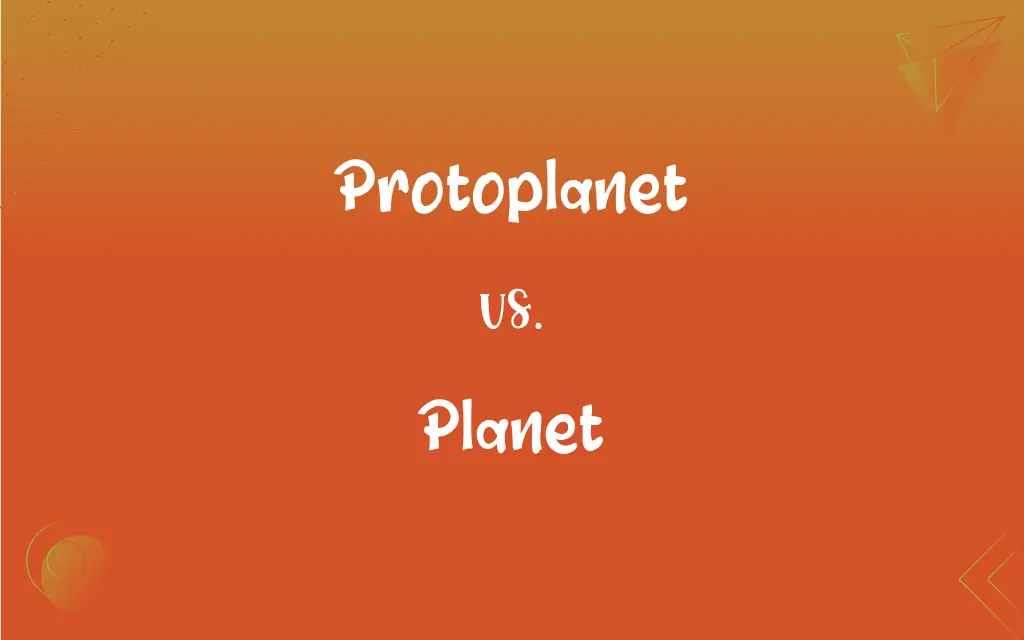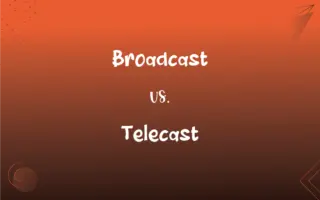Protoplanet vs. Planet: What's the Difference?
By Janet White & Aimie Carlson || Updated on May 28, 2024
A protoplanet is an early-stage body in the process of forming into a planet, while a planet is a fully formed celestial body orbiting a star.

Key Differences
A protoplanet is a large body of matter in orbit around a star that is in the early stages of planetary formation. These bodies form from the accumulation of planetesimals, which are small, solid objects that coalesce through collisions and gravitational attraction. A planet, on the other hand, is a celestial body that has completed its formation. According to the International Astronomical Union (IAU), a planet is a body that orbits the Sun (or another star), is spherical in shape due to its own gravity, and has cleared its orbital path of other debris.
Protoplanets are characterized by ongoing collisions and accumulation of material, which can lead to intense heating and differentiation into core and mantle. Planets are characterized by stable orbits and clear paths, with fully developed atmospheres and surfaces. They can sustain complex processes such as weather patterns, magnetic fields, and, in some cases, life.
Protoplanets and planets represent different stages in the life cycle of celestial bodies. The transition from protoplanet to planet involves significant growth, orbital clearing, and structural development.
Comparison Chart
Definition
Early-stage celestial body forming into a planet
Fully formed celestial body orbiting a star
Formation Stage
In the process of accumulation and growth
Completed formation and stable structure
ADVERTISEMENT
Orbit
Often found within protoplanetary disks
Orbits a star with a cleared orbital path
Shape
Irregular, becoming more spherical
Spherical due to gravitational equilibrium
Characteristics
Ongoing collisions, intense heating
Stable atmospheres, geological activity
Protoplanet and Planet Definitions
Protoplanet
Early-stage celestial body forming in a protoplanetary disk.
The protoplanet was still accumulating material from the surrounding disk.
Planet
Defined by IAU criteria for celestial bodies.
Pluto was reclassified and is no longer considered a planet.
ADVERTISEMENT
Protoplanet
Large body of matter in orbit around a young star.
Astronomers observed a protoplanet forming in a distant star system.
Planet
Fully formed body with spherical shape.
Jupiter is the largest planet in our solar system.
Protoplanet
A precursor to a fully formed planet.
The solar system once contained many protoplanets.
Planet
Object with significant gravitational influence.
A planet's gravity can affect the orbits of nearby objects.
Protoplanet
Mass undergoing differentiation into core and mantle.
Heating caused the protoplanet to develop a distinct core.
Planet
Celestial body orbiting a star with a clear orbital path.
Earth is a planet in the solar system.
Protoplanet
Body with potential to become a planet.
Given enough time, the protoplanet could evolve into a new planet.
Planet
In the traditional model of solar systems, a celestial body larger than an asteroid or comet, illuminated by light from a star, such as the sun, around which it revolves.
Protoplanet
A mass of material within a planetary disk that is thought to be an early stage in the formation of a planet.
Planet
A celestial body that orbits the sun, has sufficient mass to assume nearly a round shape, clears out dust and debris from the neighborhood around its orbit, and is not a satellite of another planet.
Protoplanet
An astronomical object, approximately the size of the Moon, formed from the mutual gravitational attraction of planetesimals; they are thought to collide with each other and slowly form planets
Planet
One of the seven celestial bodies, Mercury, Venus, the moon, the sun, Mars, Jupiter, and Saturn, visible to the naked eye and thought by ancient astronomers to revolve in the heavens about a fixed Earth and among fixed stars.
Planet
The collection of life forms supported on Earth
An asteroid that threatened the whole planet.
Planet
People as a whole; humankind or the general public
The entire planet was affected by the global recession.
Planet
One of the seven revolving astrological celestial bodies that in conjunction with the stars are believed to influence human affairs and personalities.
Planet
Each of the seven major bodies which move relative to the fixed stars in the night sky—the Moon, Mercury, Venus, the Sun, Mars, Jupiter and Saturn.
Planet
(astronomy) A body which is massive enough to be in hydrostatic equilibrium (generally resulting in being an ellipsoid) but not enough to attain nuclear fusion and, in IAU usage, which directly orbits a star (or star cluster) and dominates the region of its orbit; specifically, in the case of the Solar system, the eight major bodies of Mercury, Venus, Earth, Mars, Jupiter, Saturn, Uranus, and Neptune.
Planet
Construed with|en|the or}} this}}: {{synonym of Earth.
Planet
A celestial body which revolves about the sun in an orbit of a moderate degree of eccentricity. It is distinguished from a comet by the absence of a coma, and by having a less eccentric orbit. See Solar system.
Planet
A star, as influencing the fate of a men.
There's some ill planet reigns.
Planet
Any of the celestial bodies (other than comets or satellites) that revolve around the sun in the solar system
Planet
A person who follows or serves another
Planet
Body exhibiting geological and atmospheric processes.
Mars has evidence of ancient rivers and volcanoes.
FAQs
Can protoplanets be found in our solar system?
Protoplanets are typically found in young star systems but not in mature systems like ours.
What is a protoplanet?
A protoplanet is an early-stage celestial body in the process of forming into a planet.
How does a protoplanet form?
A protoplanet forms from the accumulation and collision of planetesimals within a protoplanetary disk.
Are protoplanets spherical?
Protoplanets are often irregularly shaped but become more spherical as they grow due to gravity.
What is a planet?
A planet is a fully formed celestial body that orbits a star, is spherical, and has cleared its orbit of debris.
Do protoplanets have atmospheres?
Protoplanets may have thin, temporary atmospheres formed from gases in the protoplanetary disk.
What happens to a protoplanet over time?
Over time, a protoplanet may accumulate more mass, differentiate into core and mantle, and potentially become a planet.
Can a protoplanet become a planet?
Yes, with enough mass accumulation and orbital clearing, a protoplanet can become a planet.
What is the main difference between a protoplanet and a planet?
A protoplanet is in the formation stage, while a planet is fully formed.
Do planets have atmospheres?
Yes, many planets have stable atmospheres composed of various gases.
How do protoplanets interact with their surroundings?
Protoplanets interact through collisions and gravitational influences within the protoplanetary disk.
What is an example of a planet in our solar system?
Earth is an example of a fully formed planet.
Can protoplanets have moons?
Protoplanets might capture or form moons during their development.
Are all planets spherical?
Yes, planets are spherical due to gravitational equilibrium.
How do planets interact with their surroundings?
Planets interact gravitationally with other celestial bodies, affecting their orbits.
How long does it take for a protoplanet to become a planet?
The process can take millions of years, depending on various factors like mass and collisions.
What is an example of a protoplanet in our solar system’s history?
The Moon is believed to have formed from a collision between the early Earth and a protoplanet named Theia.
What is a protoplanetary disk?
A protoplanetary disk is a rotating disk of gas and dust surrounding a young star, where planets form.
What is the role of gravity in planet formation?
Gravity causes the accumulation of material, leading to the formation and growth of protoplanets and planets.
Do all planets have moons?
Not all planets have moons, but many do, such as Earth and Jupiter.
About Author
Written by
Janet WhiteJanet White has been an esteemed writer and blogger for Difference Wiki. Holding a Master's degree in Science and Medical Journalism from the prestigious Boston University, she has consistently demonstrated her expertise and passion for her field. When she's not immersed in her work, Janet relishes her time exercising, delving into a good book, and cherishing moments with friends and family.
Co-written by
Aimie CarlsonAimie Carlson, holding a master's degree in English literature, is a fervent English language enthusiast. She lends her writing talents to Difference Wiki, a prominent website that specializes in comparisons, offering readers insightful analyses that both captivate and inform.
































































